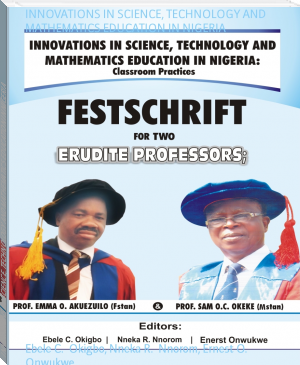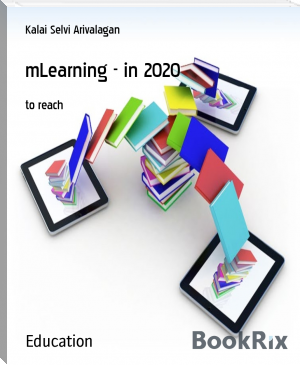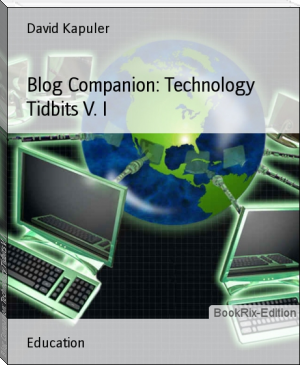INNOVATIONS IN SCIENCE, TECHNOLOGY AND MATHEMATICS EDUCATION IN NIGERIA - Ebele C. Okigbo, Nneka R. Nnorom, Ernest O. Onwukwe (best novel books to read TXT) 📗

- Author: Ebele C. Okigbo, Nneka R. Nnorom, Ernest O. Onwukwe
Book online «INNOVATIONS IN SCIENCE, TECHNOLOGY AND MATHEMATICS EDUCATION IN NIGERIA - Ebele C. Okigbo, Nneka R. Nnorom, Ernest O. Onwukwe (best novel books to read TXT) 📗». Author Ebele C. Okigbo, Nneka R. Nnorom, Ernest O. Onwukwe
Hypotheses
Hypothesis One: There is no significant difference in the mean achievement scores of chemistry students taught using the project instructional strategy and those taught using conventional (lecture) method.
Table 3: t-test on the difference in the mean achievement scores of students taught chemistry using project instructional strategy and those taught with conventional (lecture) method.
Sources of Variation
N
Df
Mean
Std.dev Sig.Level t-cal t-crit Decision
Project instructional strategy
(Experimental
Group)
Conventional lecture
(Control Group)
82
68
148
66.48
47.41
17.77
0.05 7.4825 1.624 Rejected
13.41
The t-test statistics on Table 3 revealed the mean score of 66.48 and the standard deviation of 17.77 for the experimental group, while the control group recorded the mean score of 47.41, with the standard deviation of 13.41. The table also shows the t - calculated- value of 7.4825. However, the t-calculated is greater than tie t-critical (t cal > t crit), hence the null hypothesis is rejected. Hence the alternative upheld that there is a significant difference in the mean achievement scores of students taught chemistry using project instructional strategy and those taught with conventional (lecture) method.
Hypothesis Two: There is no significant difference in the mean retention scores of chemistry students taught with project instructional strategy and those taught using conventional (lecture) method.
Table 4: t-test on the difference in the mean retention scores of students taught chemistry using project instructional strategy and those taught with conventional (lecture) method.
Group
N
df Mean
Std.dev sig.level t-cal t-crit Decision
Project instructional strategy
(Experimental
Group)
Conventional lecture
(Control Group)
82
68
66.17
148
46.90
17.47
0.05 7.6608 1.624 Rejected
13.31
The t-test statistics on Table 4 revealed the mean of 66.17 and the standard deviation of 17.47 for the experimental group, while the control group recorded the mean score of 46.90, with the standard deviation of 13.31. The table also shows the t -calculated value of 7.6608. However, the t-calculated is greater than the t-critical (t cal > t crit), hence the null hypothesis is rejected. Hence the alternative upheld that there is a significant difference in the mean retention scores of students taught chemistry using project instructional strategy and those taught with conventional (lecture) method.
As shown in Table 3, there is a difference between the mean achievement scores of the two groups. The experimental group performed better than the control group. This is an indication that project instructional strategy enhanced students’ achievement than the conventional (lecture) method. Results in table 3 further affirms that there is a significant difference in the mean .achievement scores of chemistry students taught using project instructional strategy and those taught using conventional (lecture) method. The observed t-calculated value of 7.4525 is greater than the t-critical (table value) which is 1.96, thus making the hypothesis to be rejected and alternative upheld that, there is a significant differences in mean achievement scores of those taught with project method and those taught with conventional (lecture) method.
The findings of this study is in line with the findings of Okoro (2010) and Adamu (2016) who in their studies showed that project instructional strategy improve student's achievement in sciences. And also this study agrees with the findings of Olatoye and Adekoye (2010) who reported significant effect of treatment on student's achievement in an aspect of agricultural science.
As shown in Table 2, there is a difference between the mean retention scores of the two groups. The experimental group retained more than the control group. This is an indication that project instructional strategy enhances student's retention better than the conventional (lecture) method. Results in table 4 further confirms that there is a significant difference in the mean retention scores of chemistry students taught using project instructional strategy and those taught using conventional (lecture) method. The observed t-calculated value of 7.6608 is greater than the t-critical (table value) which is 1.96, thus making the hypothesis to be rejected and alternative upheld that, there is a significant differences in mean retention scores of those taught with project instructional strategy and those taught with conventional (lecture) method.
The findings of this study is in line with the findings of Gullbahar and Tinmaz (2016) who in their studies showed that project instructional strategy improve students’ retention in chemistry. Again this study agrees with the findings of Olatoye and Adekoye (2010) who reported significant effect of treatment on students’ retention in agricultural science.
Conclusion
Based on the findings and discussion of this study, the following conclusions were made:
Project instructional strategy has statistical effect on students’ achievement in chemistry.
Project instructional strategy has statistical effect on students’ retention in chemistry.
Recommendations
On the basis of the finding of this study, the following recommendations are made:
Project instructional strategy of teaching stimulates students to effectively learn and retain the concept presented to them, teachers should be encouraged to employ it more in the teaching of chemistry.
The curriculum planners should modify senior secondary school chemistry curriculum to include the use of innovative teaching method like the project instructional strategy in order to enhance the participation and achievement of students in chemistry.
Government should organize seminars, workshops and conferences for chemistry teachers on how to use project instructional strategy in teaching chemistry.
References
Adamu, Y. (2016). Effect of project method on performance of students in social studies in Jigawa State, Nigeria. Unpublished M.Ed Thesis Ahmadu Bello University, Zaria.
Aniekwe, B.C, (2016). Effect of constructivist-based instructional model on students interest and achievement in French Language in Anambra State. Unpublished Ph.D Thesis. University of Port Harcourt.
Attah, F,O. and Njoku, Z.C. (2018). Effects of Two Teaching Methods on Secondary School Students Achievement in Writing and Balancing Chemical Equations. In Perspectives on Science and Technological Education in Nigeria. Z.C. Njoku, U.M. Nzewi and C.V. Nnaka (eds) 302-310. Nsukka: Great AP Express Publishers Ltd Nigeria.
Egolum, E.O. and Njel1ta, C.B. (2015). Teaching Chemistry for Relevance through Active Learning Instructional Strategies (ALIS). Journal of Science Education, 12, 1, 34-44.
Egolum, E.G. & Igboanugo, B.I. (2017). Effect of computer assisted instruction and power point presentation on academic achievement of secondary school chemistry students. NOCEN Journal of Science Education, 13(1), 229-238.
Gullbahar, Y. & Tinmaz, E. (2016). Implementing project-based learning and e-portfolio assessment in an undergraduate course. Journal of Research on Technology in Education, 28(3), 309-327.
Nduka, C. F. & Nlemadim, A.C (2019). The effect of project as an instructional strategy on chemistry students’ academic achievement and retention. Unpublished B.Sc Ed. Project. Nwafor Orizu College of Education, Nsugbe.
Ngwoke, D.U. & Eze, U. (2016). School Learning Theories and Application, Enugu: Immaculate Publication Limited.
Njelita, C.B. (2005). Chemistry Teachers Perception and Observed Instructional Practices. Unpublished Ph.D Dissertation, Nnamdi Azikiwe University Awka.
Okoro, R.C. (2013). Effect of project-based learning on secondary school students' academic achievement, interest and retention in Home Economics.
Okoye, P.O. (2014). Method of Teaching Science. Mary Ann Udogu, Nnamdi Egbeama and Felicia Nwakonobi (Eds) in Readings in Science Methodology for Tertiary Institutions. 293 – 327, Onitsha: New crest publishers.
Olatoye, R.A. & Adekoye, Y.M. (2010). "Effect of project based learning on agricultural science". In O.A. Afemikhe and J.G. Adewale (Eds). Issues in Educational, Measurement and Evaluation in Nigeria, Published by Institute of Education, University of Ibadan, Nigeria.
Oloyede, O.I. (2012). Enhanced mastery learning strategy on the achievement and self concept in senior secondary school chemistry. Humanity and Social Science Journal, 5 (1), 19-24
Opara, F. & Waswa, P. (2013). Enhance student achievement in chemistry through the piagetian model: The learning cycle. International Journal for Cross Disciplinary Subjects in Education (IJCOSE), 4(4), 1270-1273.
Thomas, J.N. (2013). Project-based learning overview. Novato, C.A. Buck Institute for Education. Retrieved July 10, 2017
Uduchukwu, N.A. (2016). Remedying Students Deficiencies in Distillation and Fractional Distillation Separation Techniques through Project and Inquiry Methods, P.E. Ibole, Margaret A.C. Enedoh, E.T. Owoyemi, E.N. Igboegwu in Nature of matter and separation techniques. Science Teachers Association of Nigeria (STAN) Chemistry Panel Series, 12, 41 - 45.
EFFECT OF INQUIRY-BASED LEARNING ON SECONDARY SCHOOL STUDENTS' ACADEMIC ACHIEVEMENT IN BIOLOGY IN DELTA STATE
Amechi P. Awele
&
Prof. Nneka R. Nnorom
Abstract
Students' poor performance has been ascribed to inadequate teaching and instructional methods adopted by science teachers. The study investigated the effects of inquiry-based learning on secondary school students' achievement in biology in Oshimili South LGA, Delta North Education Zone of Delta State. The study adopted a pretest and posttest quasi experimental design. The population of the study was 572 senior secondary II (SS2) biology students in Oshimili South LGA of Delta State. The sample of the study was 150 senior secondary school Biology students who were purposively selected from co-educational schools for purpose of comparison of achievement based on gender. The experimental group was taught using Inquiry based learning strategy while the control group was taught using lecture method. Data was collected using Biology Achievement Test (BAT) containing 20 multiple-choice questions with five options which was constructed by the researcher. Experts from the department of educational foundation and science education all in Chukwuemeka Odumegwu Ojukwu University, Uli Validated the Instruments used for data collection. The reliability of the instrument was established using Pearson Product Moment Correlation Coefficient which gave a reliability degree of 0.81 which is desirably high. Data collected were analyzed using the mean of the two research questions and analysis of covariance (ANCOVA) for the two general hypotheses at 0.05 level of significance. The result of the study revealed that students taught biology with Inquiry based learning strategy performed significantly better than those taught biology using lecture method. Also male students performed better than the female students. Based on the findings, the researcher recommended that teachers should endeavor to use inquiry-based method in order to enhance learner's interest, creative ability and critical thinking skill.
Keywords: Effects, Inquiry-based learning, Biology, Academic achievement.
Introduction
Biology is the study of living things which includes plants and animals. It is a fascinating study that ranges from microscopic-cellular molecules to the biosphere, encompassing the earth's surface and it's living organisms (Sarign, 2010). It is a component of the Basic sciences, alongside chemistry and physics. Biology is a core subject offered by both science and art students in the senior secondary certificate examination (SSCE) in Nigeria, it is also a pre-requisite to gain admission into the higher institution. Secondary school education is a critical level in any educational system, as it is a transitional level to higher education, it is important for the economic growth and development of a Nation, socialization and empowerment of the you who are faced with massive levels of unemployment (United Nations Education Scientific and Cultural Organization (UNESCO) 2005).
Studies have shown that there is an increasing yearly enrolment in SSCE biology, but each year candidates achieve poorly in the examination (Nwagbo & Obiekwe, 2009; Okoye &Igboabuchi, 2017; 2010; Nnorom, 2019). Statistics from West African Examination Council (WAEC 2015; 2016; 2017) revealed that students failed to obtain grades at credit level and above which would qualify them for University admission in biology and other science related disciplines (Chief Examiner's Report, 2017). Students' poor achievement in biology has been linked to a number of contributing factors among which are: ill-equipped biology laboratories, mode of teacher's delivery of the subject content (Aniekwu & Okoli 2019). Nnorom 2019 noted that students' lack of understanding of difficult concepts in biology results in poor performance of students in SSCE.
Most of the standard methods of teaching have been shown to be quite ineffective on the student’s ability to master and retain important concepts. Learning through some methods of teaching tends to be passive rather than active and does not foster critical thinking, creative thinking and collaborative problem solving, today changes have been made to explore the alternative methods of measuring the academic performance outcome (Aniekwu 2019). There is no single best method of teaching biology as there are different methods of teaching science in general. The use of a particular methods of teaching science depends on the teacher and the situation in which a topic or a concept is being taught (Okafor & Nnorom 2017).
Inquiry based learning (IBL) is an instructional approach that is principally very closely related to the development and practice of creative thinking and problem solving skills and at such is gaining interest within the science education community (Drayton & Falk, 2001). Inquiry based learning is a teaching method in which learning is driven by a process of inquiry owned by the student, starting with a scenario and under the guidance of a facilitator, students identify their own





Comments (0)